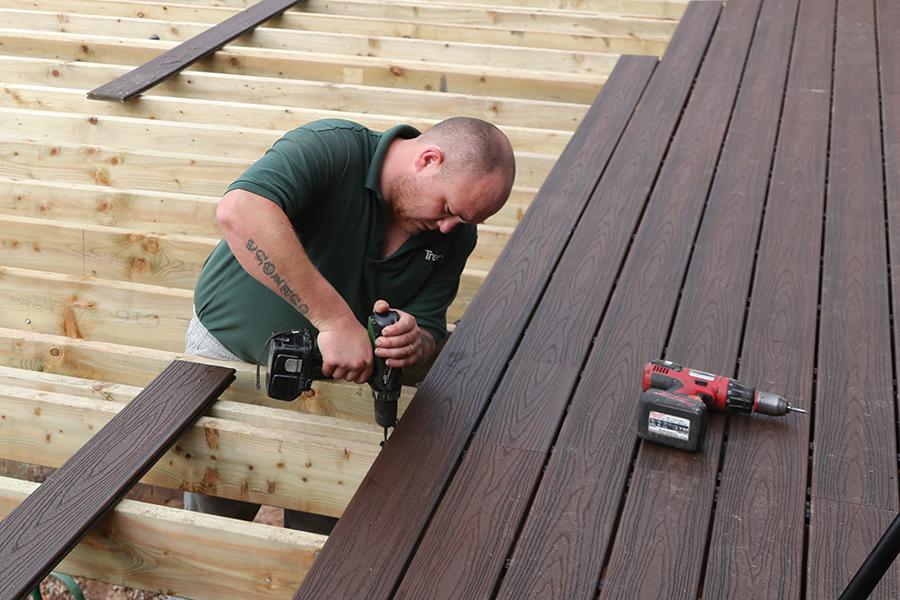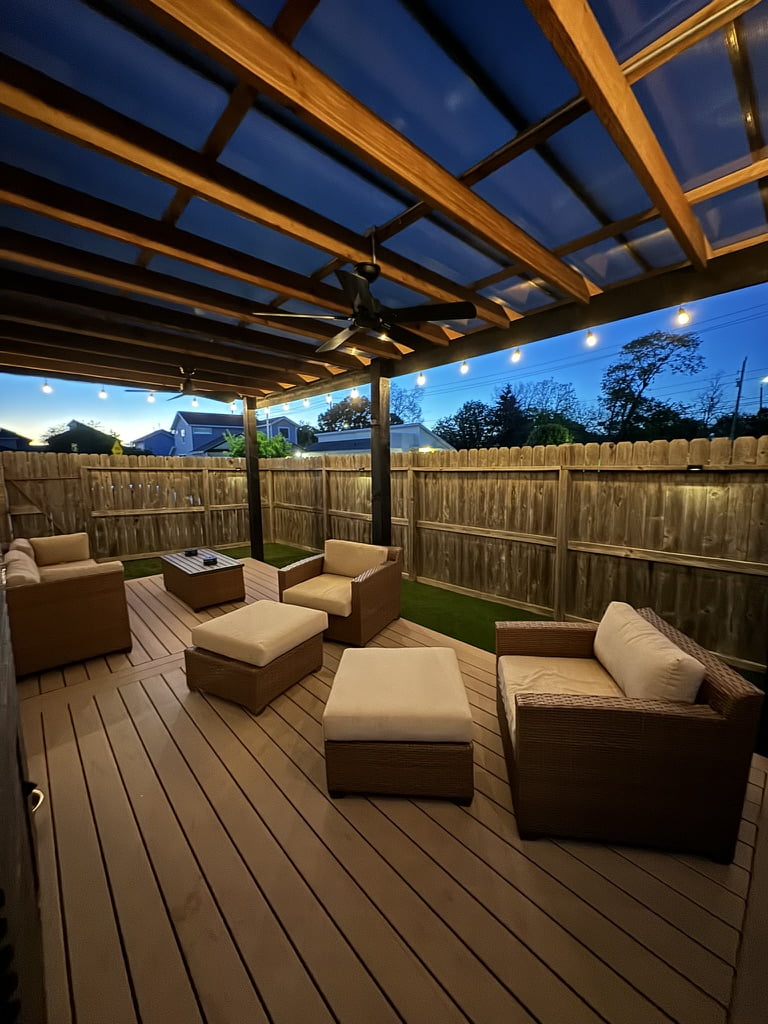Property owners love the value that comes with professional deck installation Austin TX services.
How to Select the Right Products for Your Deck Setup Task
Selecting the proper materials for your deck installment project can seem complicated. There are countless variables to consider, from toughness and upkeep to aesthetics and environmental influence. The selection in between standard timber and composite materials, each with its own set of benefits and downsides, can be specifically difficult. The secret is to balance your budget, design choices, and way of living needs to create a deck that will boost your exterior area for years to come.
Recognizing the Various Kinds Of Deck Materials
When embarking on a deck setup job, the selection of materials becomes an essential choice. Compound products, on the other hand, are a blend of wood and plastic, supplying sturdiness and resistance to weather components. By understanding these differences, house owners can make a much more educated choice on the most suitable deck material for their details requirements.
Assessing the Longevity and Upkeep Demands of Deck Products
Analyzing the toughness and maintenance demands of deck products is an essential action in deck installment. Resilience entails the product's capacity to withstand rough weather problems, wear and tear, and its durability. For instance, cedar and redwood are naturally immune to rot and pests, making them resilient options. On the other hand, pressure-treated timber, while long lasting, may need more upkeep because of its vulnerability to splitting and warping.
Understanding maintenance requirements is similarly vital. Some products call for routine securing or tarnishing to preserve their appearance and stand up to dampness damage, while others, like composite decking, require much less upkeep. By evaluating these factors, one can pick the most ideal decking product, making sure a balance between resilience, upkeep needs, and visual appeal.
Price Evaluation: Contrasting Wood and Compound Decking
Although cost may at first seem like a secondary concern, it is a significant factor when comparing timber and composite outdoor decking. On the various other hand, composite decking, while pricier initially, calls for much less maintenance, potentially decreasing long-term expenses. Possible deck owners must consider their budget and readiness to preserve their decks when choosing in between timber and composite decking.
Aesthetic Appeals and Style Flexibility of Decking Products
While cost is a crucial factor to consider, the visual appeal and layout adaptability of decking products additionally play a considerable duty in the decision-making procedure. Different products provide varying levels of visual charm. Natural wood outdoor decking offers a timeless, ageless appearance, while composite materials supply a broad array of shades and appearances to fit diverse tastes and styles. Similarly, layout adaptability describes the capacity to shape and control the outdoor decking product to meet particular style requirements. Wood, as an example, provides high style adaptability due to its ease of cutting and forming. Compound products, while much less versatile in layout, are still versatile enough for a lot of deck layouts. These elements, therefore, are essential determinants in the selection of decking material.
Ecological Effect of Decking Materials
When selecting outdoor decking products, one should consider not just aesthetic appeals and longevity, however additionally the ecological impact. It is very important to examine the sustainability of materials and discover recycled outdoor decking alternatives. In addition, comprehending the potential effect on neighborhood ecological communities will make certain a much more environmentally accountable selection.
Analyzing Product Sustainability
In the realm of deck construction, evaluating material sustainability is a critical action. This entails assessing the ecological influence of each prospective product, taking into consideration factors such as the power required for its production, its carbon impact, and its end-of-life disposal or reusing alternatives. Wood is a sustainable resource, however unsustainable logging techniques can lead to deforestation. Composite decking you can try here products commonly integrate wood and plastic, minimizing the demand for new hardwood but boosting dependence on fossil fuels. Aluminum and other steels might be more long lasting and recyclable, but their extraction and handling can be energy-intensive. Hence, the choice of decking materials must stabilize functionality, looks, price, and sustainability to ensure a liable and resilient setup.
Recycled Decking Choices

Compound decking is especially prominent as a result of its sturdiness and convenience of maintenance. It's immune to rot, bugs, and fading, making it a lasting alternative. Recycled plastic decking, on the various other hand, is very durable important site and calls for minimal upkeep. While these products may bring a greater first expense, their long life and reduced environmental impact make them official statement a wise investment for the eco-conscious property owner.

Effect On Local Environments
While the advantages of using recycled products for decking can not be overemphasized, it's just as important to think about the more comprehensive environmental implications of these choices. Appropriate disposal of old outdoor decking is important to reducing landfill waste. Basically, an eco-conscious deck job demands careful material selection, lasting sourcing, and responsible disposal.
Making Your Final Choice: Tips for Selecting the very best Deck Materials
As the post changes into the subtopic of "Making Your Last Decision: Tips for Selecting the very best Deck Materials", it is critical to comprehend the range of deck products offered. Striking an equilibrium between toughness and looks is crucial in this option process. The adhering to conversation will certainly assist readers in making an educated option based upon these vital factors to consider.
Comprehending Various Deck Materials
The job of picking the appropriate materials for your deck setup can seem discouraging due to the huge variety of options available. Plastic or PVC decks are even extra resilient and need much less upkeep than composite materials, however they can look much less natural. Aluminum decks are strong, lightweight, and immune to rot, but they are also the most pricey alternative.
Sturdiness vs. Aesthetics Balance
Stabilizing resilience with appearances can be an obstacle when choosing deck materials. The choice commonly comes down to individual choices and the deck's intended usage. High-traffic areas may require sturdy materials like composite decking, which stands up to wear and tear yet might lack the natural elegance of wood. On the other hand, wood uses a classic appeal and heat that synthetic products battle to reproduce. It needs a lot more maintenance and might not last as long. Home owners need to strike an equilibrium, considering both the deck's functional demands and their visual choices. By doing so, they can guarantee their deck remains a practical and eye-catching outside room for years to come.
Final thought
To conclude, picking the best materials for your deck installation job requires careful consideration of elements such as durability, upkeep, cost, aesthetic appeals, and ecological influence. Whether you choose standard wood or composite materials, your choice needs to line up with your budget plan, layout choices, and lifestyle. Inevitably, the finest outdoor decking product is one that boosts your outside room and gives satisfaction for years ahead.